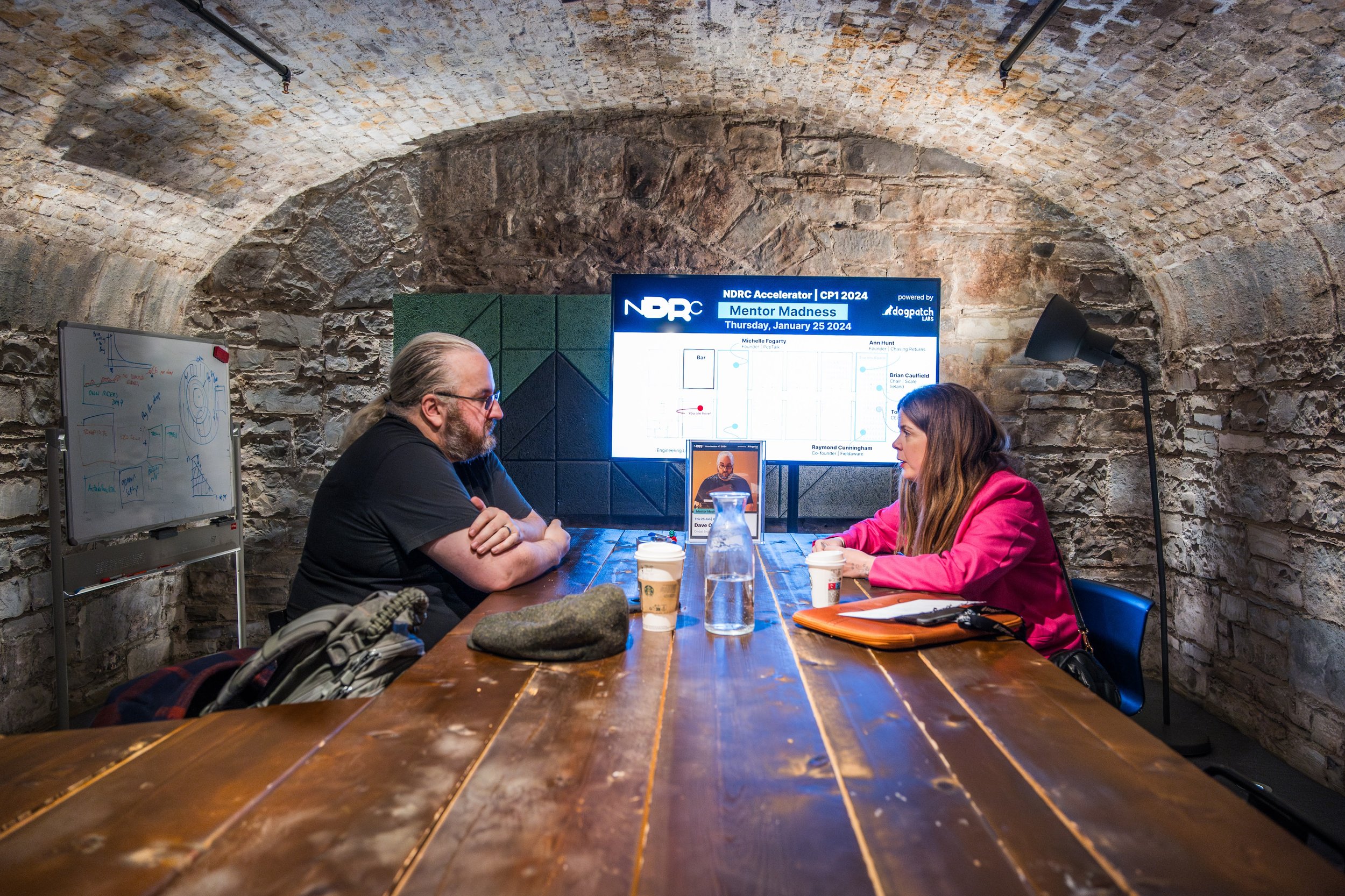“This capability could go anywhere and everywhere.” - Veronica Breene’s plan to fix the mortgage industry with Vesta Insights
An interview with Veronica Breene & Shubham Mishra, Co-founders of Vesta Insights, by Joe Gorman NDRC Programme Manager.
Veronica Breene (CEO) and Shubham Mishra (CTO) of Vesta Insights
Housing is the dominant issue in Ireland today. Even people who have been living under a rock know that, because rent under the rock probably is around €1,200 a month before bills.
The housing crisis guides conversations online, in workplaces, and in the Dáil, where the answers to tough questions on Ireland’s housing market and the seemingly insurmountable cost of credit will shape the outcomes of the next election. It is an area that desperately needs innovative thinking, even if it proves difficult to implement. One company aiming to make a difference is Vesta Insights, the AI startup led by Veronica Breene that is smoothing the ripples of unconscious bias in the mortgage industry.
Vesta uses ten sophisticated machine learning models on top of the data it has access to (current data source: US Federal Home Loan Mortgage Corporation) to predict mortgage arrears in the US with what CTO Shubham Mishra says has “very good accuracy and precision rates.” While Vesta doesn’t give recommendations on individual mortgage decisions, underwriters can use the technology to identify patterns in decision-making where there may be evidence of bias or recurring anomalies.
Its machine learning models assess different types of arrears (from missing a couple of payments right up to foreclosures) and while it is currently focused on the mortgage book, Breene says Vesta can apply its framework to other lending products too.
Every bank has internal ratings models: frameworks which estimate the probability of default and the subsequent loss to the bank. Linear models like these rely on rule sets that can automatically approve or decline people who are notably strong applicants or potentially high-risk. Many mortgage applicants obviously fall outside these rules, ultimately leading to an instant approval or auto-decline. These folks then try their luck with underwriters who make a personal judgement. Breene and Vesta are aiming to remove the ambiguity and unconscious bias from those judgement calls:
“[Our value] is twofold - there’s the collection process for people who go into bad debt, where we identify the fastest possible way for someone to get out of arrears. Then there’s credit assessment and modelling for the banks. In essence, we’re improving the underwriters’ skills at the highest level. We are identifying where [underwriters] are over-indexing in their decision-making and improving the portfolio for people who have been declined.”
Breene pitches at NDRC x Founders Demo Day, April 2024
Mishra jumps in to illustrate: “Say for example, if one loan gets approved and another loan which has similar characteristics - a similar credit ratio, similar debt-to-income ratio - gets declined. We’re identifying the potential factors from historical data as to why that decision was made. As Veronica was saying, it will improve the decision-making process for banks - supplying them with the reasoning why two similar-looking applications are different.”
I asked him how Vesta would help consumers get out of arrears; “If someone has a problem and the bank reaches out to them promptly, they might refinance or organise a 2-3 month grace period. We can identify this earlier and strengthen the partnership between the lenders and the consumer.”
Vesta’s tech has worked on US data, and most recently on Irish data. Reflecting on the housing market here, I asked Breene about how we’d managed to create such a broken system for mortgage arrears, where a huge amount of mortgages have been overdue past five years:
“In every other country in the world, the house would be taken off them. They don’t want to keep the house but they’re locked in because of regulatory practices in Ireland. Our main banks were nationalised and due to our culture in Ireland, where we want to own our properties, the Central Bank took the decision post-2008 to not enforce repossession orders. Consequently, maybe 400 people have been evicted from their homes, but now we have over 11,000 people who are handcuffed to mortgages they can’t get out of.”
“They’re not actually living in these homes, but they can’t get out of the mortgages. They’re with vulture funds now with interest rates of what - seven per cent?” She pauses for a moment: “Sorry, I’m getting worked up now.”
Founders need to care deeply about the problem they’re solving. That much is clear with Breene, who left behind a career in senior leadership at Deutsche Bank, KPMG, and Novartis to pursue a PhD in Explainable AI and become a startup founder. For someone professionally obsessed with risk, that might seem like a bold move. But it was a calculated bet.
Breene was conducting PhD research on AI applications in the mortgage space when she “started ringing around and talking to people that I used to work with and saying: “Would this be useful?” Almost immediately, someone inquired about buying the idea. “I thought: listen, I'm on to something here. If they want to buy it and we don’t even have a model or product yet, there's something there.”
Does Breene worry about how AI tools are being received in the mortgage industry?
“Everybody thinks that using AI somewhat dehumanises or automates and we are not doing that. [The AI Act] classifies different technologies into different risk factors. And if you are making a decision, you're seen as high-risk. We're not interfering with the decision process - that will remain as is. We're a recommendation engine that analyses entire portfolio behaviour - not impacting the final decision.”
Breene during NDRC Accelerator mentoring session
“We don't want to say you are auto-declined or auto-approved. From a risk perspective, it's much more difficult and from an ethical perspective, I don't necessarily agree that that's the route that should be taken with AI.”
Breene, Mishra, and the growing Vesta team have a big job on their hands, reforming a sector that will shape the availability of housing and credit in a country that urgently needs more efficient access to both. Breene has been animated throughout our conversation and lights up when she talks about the growth potential for the business:
“While we are predicting mortgage arrears in this case, the framework and approach that we are using with AI is how you predict outliers in clinical trials and potential issues in energy management. We're focused on one tiny, narrow version of this for predicting mortgages, but this capability could go anywhere and everywhere.”
With extensive experience in finance, the pharmaceutical industry, and academia, you can imagine that her tolerance for bureaucracy and process is pretty high. Is she enjoying it?
“Rarely do you get to do something as exciting as what we’re doing now. We’ve done more work in the past six weeks than I’ve done with teams of forty over three years. We’ve done that because it makes us feel alive. Something is growing and we can all feel it.”



